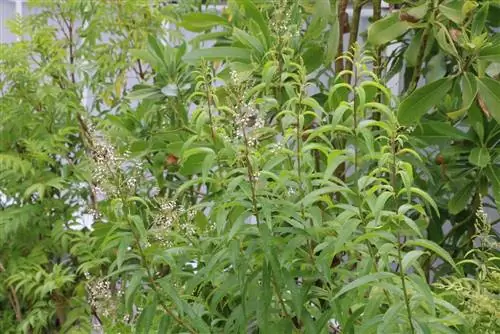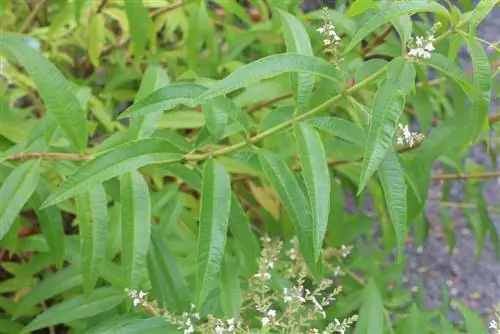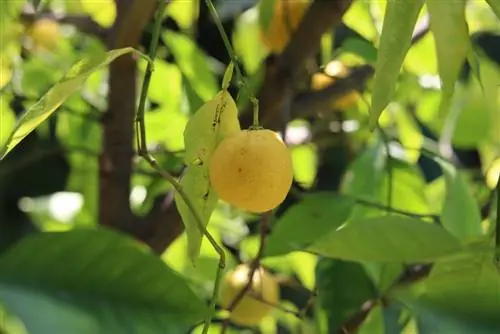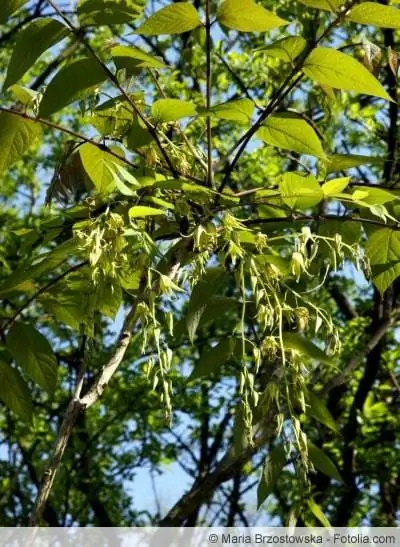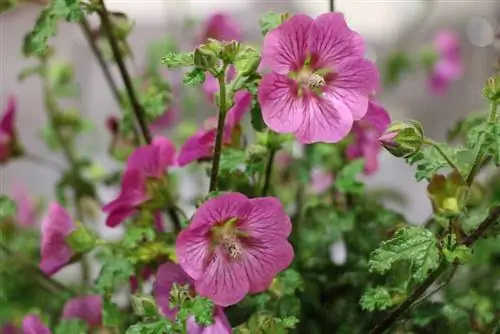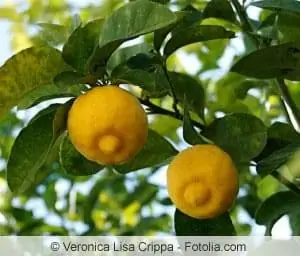- Author admin [email protected].
- Public 2023-12-17 03:39.
- Last modified 2025-06-01 06:48.
It is a feast for the senses, because a lemon verbena enchants with fragrant foliage, delicate flowers and a revitalizing aroma. The lemon bush easily takes on a dominant role in the herb garden arrangement, provided a gardener lets it. The culinary herb rarely reaches its natural height of more than 2 meters; The possible uses in drinks, dishes or scented potpourries are too diverse. Lemon verbena doesn't mind a daily harvest anyway. The following lines will introduce you to the uncomplicated care and propagation.
Profile
- Plant family of the verbena family (Verbenaceae)
- Name of the species: Lemon bush (Aloysia citrodora)
- Other names: lemon verbena, lemon scent shrub
- Deciduous, perennial shrub
- Native to South America
- Temperature minimum - 5 degrees Celsius
- Intense lemon scent as an outstanding attribute
- White to cream-colored flower spikes from June to August
- Growth height from 2 to (rarely) 6 meters
- Use as a spice, scent and ornamental plant
The lemon bush is often located in the natural garden as a popular pasture for butterflies and bees.
Location
The heart of successful care is choosing the right location for a lemon bush. In combination with an adequate substrate, all other aspects are reduced to a manageable framework. This is what the ideal location should be like:
- Full sun, sunny to partially shaded
- Protected from strong gusts of wind and pelting rain
Soil and substrate
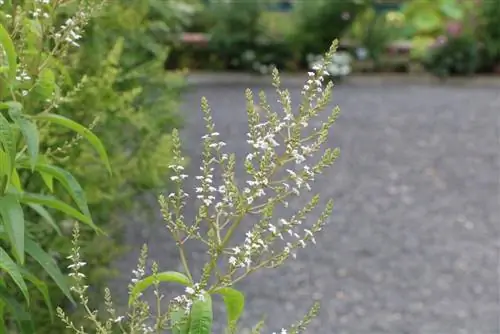
In the local regions, hobby gardeners prefer pot culture for their lemon bushes. However, there is nothing wrong with growing this magnificent shrub in the bed throughout the summer.
- Humoser, well-drained garden soil
- Preferably fresh-moist to sandy-loose
- Neutral to minimally alkaline pH value
In the pot, the lemon scented bush likes to stretch out its roots in high-quality potted plant soil that has good water storage capacity. This is best achieved by adding perlite, lava granules or vermiculite. The substrate does not dry out so quickly without undesirable waterlogging forming.
Tip:
Smart hobby gardeners place the lemon verbena and its pot in the ground. This means that the plant spends the summer in the rich garden soil and is very easy to take out for relocation to its winter quarters.
Watering and fertilizing
The water supply is closely related to the site conditions. The sunnier the location, the higher the water requirement. In order to strike the right balance here, the classic thumb test serves as a proven indicator. Press your finger a few centimeters deep into the substrate. If the surface feels dry, water it. This is naturally the case more often in the terracotta pot on the windswept balcony than in the sheltered partial shade of the garden.
- Keep the potting soil constantly moist
- Do not water over leaves and flowers
- Ideally water early in the morning or late evening
Ice-cold water from the tap gives even the robust lemon bush a cold shock. Therefore, use stale water that has had some time to adapt to the ambient temperature.
Two aspects are the focus of an adequate supply of nutrients: Lemon verbena needs plenty of energy to form their extensive biomass. The leaves intended for consumption should not be contaminated with chemical substances. The requirements are met by organic fertilizer, which has long dominated modern hobby gardens in various forms. Particularly recommended here are compost, granulated cattle or horse manure, guano in the shape of sticks or cones, and vermicompost. The problem of administration in the planter is solved with liquid compost, plant manure or worm tea. In addition, specialist retailers offer a range of organic liquid preparations.
- Fertilize organically every 14 days from April to August
- Never apply fertilizer to dry substrate
From the second half of August, the administration of additional nutrients ends so that the lemon bush can prepare for the coming winter.
Wintering
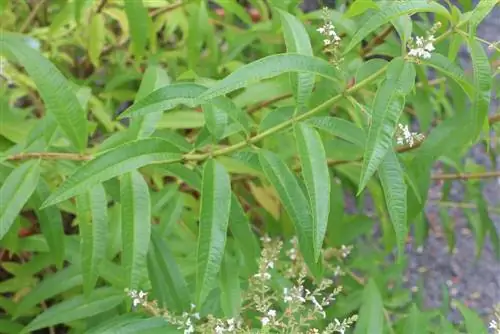
Given a temperature minimum of -5 degrees Celsius, the lemon bush is not considered winter hardy by European standards. The plant can only withstand this frosty cold for a short time, so at least an early onset of winter or delayed ground frost does not immediately mean the end. Nevertheless, the lemon verbena has the potential for successful overwintering under the following conditions:
- Short all shoots by 75 percent before the first frost
- It is dark in the winter quarters, with temperatures between -2 and +5 degrees Celsius
- As a rule, the plant sheds all of its leaves
- The brighter the lighting conditions, the warmer the room temperature
- Water every now and then
- Do not give fertilizer
In spring, gradually accustom the lemon verbena to brighter lighting conditions until it can tolerate full sun. At the same time, the amount of irrigation water increases and the first fertilizer is added. Remove any shoots that did not survive the winter. In May the spice plant starts the new season with its first shoots.
Tip:
When harvesting, the entire shoot is always cut off in order to pluck off the leaves. This care promotes extra bushy growth.
Propagation
Every gardener would like to cultivate several specimens of a plant that brings so much joy. There are various approaches for propagation that pose no stumbling blocks even for beginners:
Cuttings
If a lemon bush is at the peak of its performance during the summer, experienced hobby gardeners do not let this time go to waste. If cuttings are cut now, the small powerhouses will develop into independent plants within a short time. Here's how to do it:
- The ideal cutting is half woody, 10-12 centimeters long and has several leaves
- Defoliate the lower half of the shoot and halve the foliage of the upper half
- Fill small pots with nutrient-poor soil, such as peat sand or coconut hum
- Insert one cutting each so deep that at least 1 pair of leaves can be seen
- Moisten the substrate and put a plastic cover over it with wooden sticks as spacers
In a partially shaded location, the cuttings root quickly at temperatures between 18 and 25 degrees Celsius. The substrate must not dry out during this time. If the offspring presents fresh shoots while the first roots grow from the opening in the ground, propagation is successful. The cover is lifted more and more frequently until it completely gives way. By next spring, a beautiful lemon verbena will have developed and will produce an aromatic harvest from June onwards.
Lowers
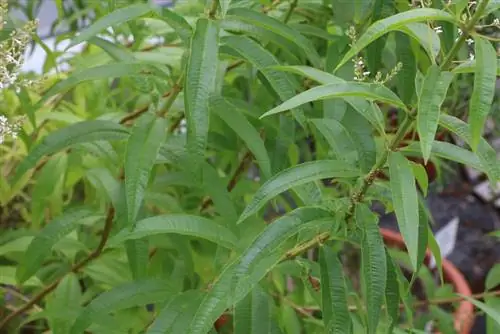
If you know what you're doing, you don't even bother cutting and caring for cuttings. At the beginning of summer, annual shoots can alternatively be used as lowering plants. To do this, pull a he althy branch to the ground, loosen the soil there and create a 10 centimeter deep furrow. Place part of the shoot in here, bury it and fix it with stones. While the mother plant continues to supply the sinker with nutrients, it roots in the soil. In autumn, cut off the young plant and plant it in a pot for overwintering. The lemon verbena is planted from mid-May.
Sowing
Seeds can be sown all year round. Since seedlings often rot in winter due to the lack of light, spring from March/April is considered a suitable date for this form of propagation.
- Fill a seed tray with lean substrate, such as unfertilized standard soil
- Mix the dust-fine seeds with bird sand and scatter them
- Sift the light germinators a maximum of 0.5 centimeters with sand or vermiculite
- Spray with water and cover with glass or foil
Place the seeds in a partially shaded window seat at 20 degrees Celsius until germination. The young plants are pricked when they have 2 to 3 pairs of true leaves.
Conclusion
The lemon bush rounds off the creative plant composition of the herb garden. If its lemony scent clouds fill your nose all over the garden and the green leaves create refreshing drinks and delicious dishes, you have done everything right. Getting there is not difficult, as care and propagation are easy. A sunny location and a balanced supply of water and nutrients are sufficient for a lemon verbena. Cuttings, cuttings and seeds provide further specimens of this wonderful fragrant and herbal plant.

